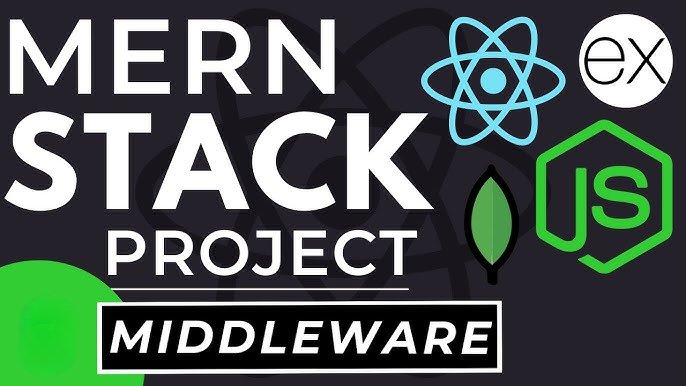What Is Middleware In MERN Stack?
Middleware in MERN Stack bridges client-server communication, handling requests, authentication, and data processing seamlessly.

Introduction
Middleware is a core concept in the MERN stack, particularly in the Express.js backend framework. It acts as a bridge between incoming client requests and the server's responses, enabling developers to handle specific tasks efficiently. Middleware functions are modular, and reusable, and play a crucial role in simplifying backend operations such as request parsing, authentication, and error handling. By allowing developers to process requests in a step-by-step manner, middleware ensures better scalability, maintainability, and flexibility in web application development. Refer to the MERN Stack Developer Course with Placement for more information.
What Is Middleware In MERN Stack?
Middleware in the MERN stack refers to functions that sit between the request and response cycles in a web application. It processes incoming requests, performs specific tasks, and either terminates the request-response cycle or passes control to the next middleware function.
In the MERN stack, middleware is typically used in the Express.js layer, the backend framework that handles server-side logic. Middleware functions have access to the request object (req), response object (res), and the next function, which passes control to the next middleware in the sequence.
Common Uses of Middleware in MERN
· Request Parsing: Middleware like body-parser (integrated into Express) parses incoming request payloads (e.g., JSON or form data) and makes them accessible via req.body.
· Authentication: Middleware is used to check user credentials or validate tokens (e.g., using jsonwebtoken) for secure routes.
· Error Handling: Custom error-handling middleware catches errors during request processing and sends appropriate responses.
· Logging: Middleware like morgan logs HTTP requests for debugging and monitoring.
· Cross-Origin Resource Sharing (CORS): Middleware allows or restricts access to your resources from other domains.
Example Middleware Usage
“app.use(express.json()); // Parses JSON requests
app.use((req, res, next) => {
console.log(`${req.method} request to ${req.url}`);
next(); // Proceeds to the next middleware
});”
Thus, Middleware enhances modularity and flexibility in the MERN stack by simplifying common tasks and enabling a streamlined development process. It is essential for handling diverse server-side operations efficiently.
What Is It Used For?
Middleware in the MERN stack plays a crucial role in handling and processing client requests on the backend, particularly within the Express.js framework. Middleware serves as a bridge between the incoming HTTP request and the final response sent to the client, performing specific tasks at each step of the request-response lifecycle.
Key Uses of Middleware in the MERN Stack
1. Request Parsing
Middleware processes and structures incoming data. For example:
· express.json() parses JSON data in request bodies and makes it accessible via req.body.
· express.urlencoded() handles URL-encoded form submissions.
2. Authentication and Authorization
Middleware validates user credentials or tokens before granting access to protected resources. For example:
· jsonwebtoken verifies JWTs (JSON Web Tokens) for user authentication.
· Custom middleware can ensure users have the necessary permissions for specific actions.
3. Error Handling
Middleware detects and manages errors in the request-response cycle. Error-handling middleware catches exceptions and sends structured error messages to the client, improving debugging and user experience. Check the MERN Stack Developer Certification courses to learn more about Error Handling in MERN Stack.
4. CORS (Cross-Origin Resource Sharing)
Middleware like cors enables or restricts access to your server's resources from different domains. This is particularly useful when developing applications with separate frontends and backends.
5. Logging and Monitoring
Middleware such as morgan logs HTTP requests to monitor application behaviour, which is useful for debugging and performance tracking.
6. Routing Control
Middleware can define conditions for executing specific routes. For example, you can create middleware that checks for user roles before accessing admin routes.
7. Custom Functionality
Developers can create custom middleware for tasks like rate-limiting, input sanitization, or modifying requests and responses dynamically.
Example: Authentication Middleware
“const authMiddleware = (req, res, next) => {
const token = req.header('Authorization');
if (!token) return res.status(401).send('Access denied');
try {
const verified = jwt.verify(token, process.env.JWT_SECRET);
req.user = verified;
next();
} catch (err) {
res.status(400).send('Invalid token');
}
};”
In short, Middleware is indispensable in the MERN stack for handling routine backend tasks, enforcing security, and managing errors. Its modular design enhances application flexibility, maintainability, and scalability. Consider joining a MERN Stack course or Full Stack Python Developer Course for complete guidance.
Conclusion
In the MERN stack, middleware is a powerful tool for streamlining backend processes like request parsing, authentication, error handling, and more. It ensures modularity, flexibility, and scalability by allowing developers to handle tasks efficiently in the request-response cycle. By leveraging built-in and custom middleware, MERN applications can achieve enhanced security, better performance, and improved maintainability, making middleware an essential component for modern web application development.
What's Your Reaction?





















